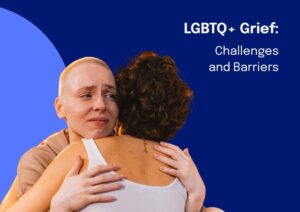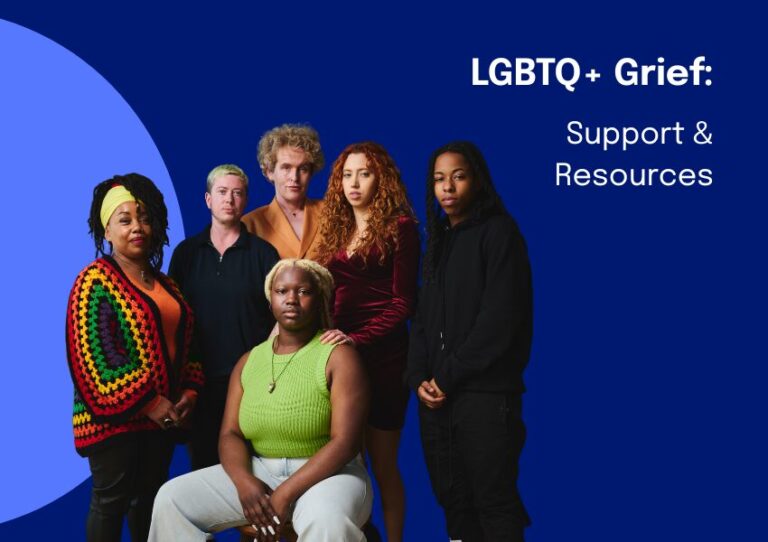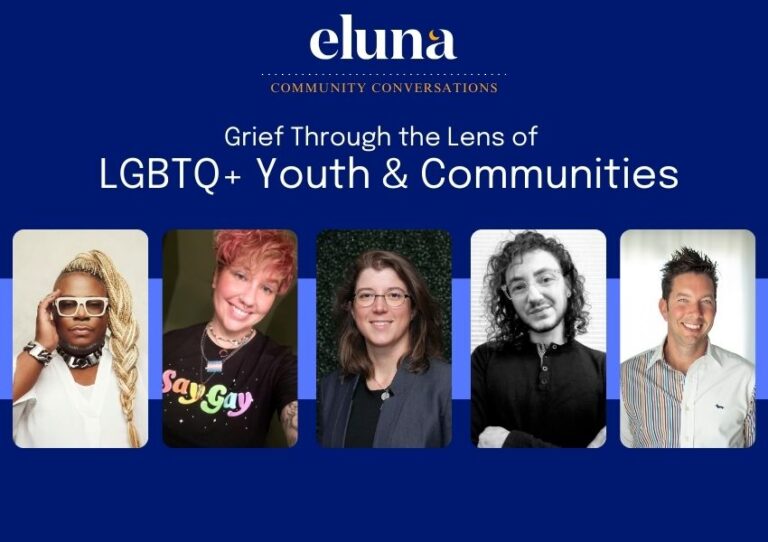LGBTQ+ Grief: Challenges and Barriers
 While grief is an integral part of the human experience, LGBTQ+ youth and adults often navigate additional layers of emotional complexity due to societal stigma, discrimination, and the struggle for acceptance in a heteronormative world. The loss of loved ones or mentors, facing rejection from family or society, and the trauma of hate crimes are just a few examples of the grief experiences that can be amplified for LGBTQ+ community members. In this article we delve into the additional layers of disenfranchised, compounded, and collective grief often experienced by LGBTQ+ youth and communities. Understanding and acknowledging these complex facets of grief are essential in fostering compassionate and queer affirming spaces.
While grief is an integral part of the human experience, LGBTQ+ youth and adults often navigate additional layers of emotional complexity due to societal stigma, discrimination, and the struggle for acceptance in a heteronormative world. The loss of loved ones or mentors, facing rejection from family or society, and the trauma of hate crimes are just a few examples of the grief experiences that can be amplified for LGBTQ+ community members. In this article we delve into the additional layers of disenfranchised, compounded, and collective grief often experienced by LGBTQ+ youth and communities. Understanding and acknowledging these complex facets of grief are essential in fostering compassionate and queer affirming spaces.
Disenfranchised Grief:
Unlike more conventional forms of grief, disenfranchised grief occurs when the loss is not openly acknowledged or socially embraced, such as: when the relationship is not considered legitimate, the deceased falls outside of accepted norms, or the grieving individual is part of a marginalized group. Oftentimes the cause of death itself is also stigmatized (overdose, suicide, COVID, HIV/AIDS, etc.). The absence of public recognition and validation can lead to a complex and challenging grieving process, where individuals may grapple with feelings of shame, invisibility, and the sense that their grief is unwarranted.
For queer and trans people, disenfranchised grief can occur when:
- Their relationships are not accepted or considered illegitimate, and partners are excluded from hospital visits, funerals, passage rituals, and family gatherings that take place after the death of their person.
- Experiencing a loss while estranged from their families of origin and are unable to go to funerals and other rituals because of strained relationships.
- Navigating complex grief responses because of how that person treated them because of their gender/sexual orientation.
- Mourning a relationship with a person who is alive, but unaccepting of who they are because of their gender/sexual identity.
Compounded Grief:
Compounded grief is when an individual faces multiple losses or traumatic events within a relatively short period. This overwhelming emotional experience demands coping with interconnected sorrow and distress, amplifying the pain and challenges of each individual loss. Recognizing and understanding compounded grief is vital in providing compassionate support and effective interventions to help those navigating this complex landscape.
Collective Grief:
Collective grief is a shared emotional response that transcends individual mourning, arising from a common loss experienced by a group, community, or society as a whole. Within LGBTQ+ communities, this form of grief also arises from the collective impact of discrimination, prejudice, violence, and the struggle for acceptance that queer and trans individuals endure as they navigate their identities in a heteronormative world.
For queer and trans people, compounded and collective grief can occur when:
- Hearing of multiple attacks or murders of LBGTQ people on the news or within a community.
- Having lived through the HIV/AIDS pandemic and the multiple losses of friends and loved ones.
- Facing rejection or alienation from family and society.
- Grieving a death by suicide, which has disproportionately affected LGBTQ youth and communities.
Barriers to Bereavement Support:
Queer and trans individuals may face several barriers to accessing bereavement support, making their grief process more challenging. One significant barrier is the lack of understanding and awareness among bereavement support providers regarding the unique experiences and needs of LGBTQ+ communities. This can lead to inadequate or inappropriate support, leaving grieving youth and adults feeling misunderstood and isolated.
Additionally, social stigma and discrimination can deter queer and trans people from seeking help, as they may fear facing further judgment or prejudice in a vulnerable state. Lack of inclusive language, representation, and cultural competence within support services can also contribute to a sense of alienation and reluctance to reach out for assistance.
Moreover, limited access to LGBTQ+ friendly support groups or resources in some areas can make it difficult for individuals to find a safe and understanding space to process their grief. Addressing these barriers and fostering a more inclusive and queer affirming approach to bereavement support is crucial in ensuring that LGBTQ+ youth and adults receive the care and understanding they deserve during times of loss.
Click here for a list of support strategies to cultivate queer affirming spaces.

